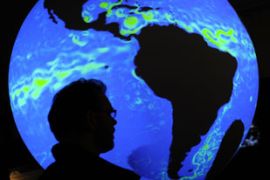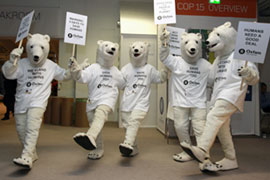UN chief urges unity at Copenhagen
Ban Ki-moon says nations must stop “pointing fingers” at climate change talks.

His comments also come a day after a number of developing countries temporarily boycotted talks, demanding deeper emission cuts by industrial nations be brought to the forefront of discussions.
Deep divisions
Negotiations resumed, but deep divisions remain between rich and poor countries over emissions targets and financing for developing countries to deal with global warming.
| In depth |
|
|
Al Jazeera’s Jonah Hull, reporting from Copenhagen, said that there was a sense of urgency at the climate summit.
“What happens in the next 48 hours amongst the ministerial delegations is crucial and that isn’t lost on anybody,” he said.
“There were always going to be deep divisions between developed and developing countries.
“On one hand, you have big, industrial, rich countries that stand to lose an enormous amount in terms of the emission cuts they’ll have to make that will affect their economies and also the money contributions that are being looked for from them.
“On the other hand, you have the poorer countries and some of them are looking at the destruction of their entire way of life. Some nations will simply sink into the sea. They’re not worried about their economies, they’re worried about their very existence.
Significant participation
The most significant disagreement on Tuesday appeared to be between the United States and China, the world’s two biggest emitters of greenhouse gases.
| In video |
|
Al Jazeera’s Alan Fisher reports on the crucial final stage of the Copenhagen talks |
China and other developing countries have been resisting US-led attempts to make their cuts in emissions growth binding, instead of voluntary, and open to international scrutiny.
“You can’t even begin to have an environmentally sound agreement without the adequate, significant participation of China,” Todd Stern, the US special climate envoy, said.
Beijing has accused developed countries, including the US, of trying to avoid their obligations to help poor nations fight climate change.
Jiang Yu, a Chinese foreign ministry spokesman, said that financial support for developing nations was “the key condition for the success of the Copenhagen conference”.
Organisers said that environment ministers would work deep into night on Tuesday to narrow differences, saying the bulk of the work must be complete before most world leaders arrive on Thursday.
“We have seen significant progress in a number of areas but we haven’t seen enough of it … we are in a very important phase,” Yvo de Boer, the UN climate chief, said.
‘Lack of clarity’
However, Jairam Ramesh, India’s environment minister, told the Reuters news agency that the talks could stall on a number of issues.
 |
| World leaders are under pressure tyo reach a deal before the end of the summit [Reuters] |
“There is confusion and lack of clarity at this stage,” Ramesh said.
“There could be breakdown on many issues. We still don’t have great clarity on how the next few days are going to evolve.”
More than 110 world leaders are expected at the climax of the talks, including Barack Obama, the US president, and Wen Jiabao, the Chinese prime minister.
Robert Mugabe, Zimbabwe’s president, was among the first heads of state to arrive in the Danish capital on Tuesday, avoiding a travel ban imposed by Western nations.
Gordon Brown, the British prime minister, is due to arrive later in the day, two days earlier than expected in an attempt to help push the talks forward.
Leaders are aiming for a political agreement rather than a legally binding treaty, focusing on individual targets on emissions cuts and financing for developing countries.
Scientists say global warming will create rising sea levels, increasing drought, more extreme weather and the extinction of some species.
